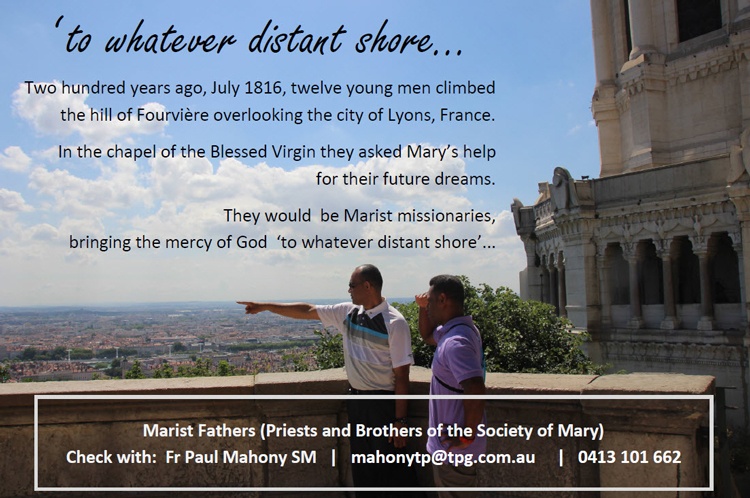The work to be done is Mary’s work. Fr Colin used that phrase frequently – “Mary’s work”. Marist presence is therefore motivated and shaped by Mary’s presence. Fr Colin did not focus on Marian devotions or pieties. Jean Coste SM writes:
Here we touch on what I am prepared to call the Marist paradox which must be grasped if there is to be understanding of the way that the role of Mary is lived in the Congregation (ie the Society of Mary) at the present time.
It might be put like this: among congregations claiming to be Marian, that of the Marist Fathers is one of the least Marian and one of the most Marian of all. (Cited by Craig Larkin SM, A Certain Way: An Exploration of Marist Spirituality, Centre for Marist Studies, 1995, 67.)
Jean Coste offers a thoughtful reflection on Mary’s work and how that might be an inspiration for Marists:
The New Testament is short on details, but clear on the fact: Mary was there: She was joined to the Church at the moment of greatest uncertainty and biggest risk, in the days preceding Pentecost. We are faced here with a situation whose meaning can only be grasped in faith.
The mother of a deceased great leader or founder is not normally expected to mingle with the members of the movement he founded. She is in a totally different position: they received everything from him and set out to follow him; but she gave him life, formed him, and has a unique relationship with him. She has no need to raise the party flag to express a communion of mind and purpose which was probably there long before the foundation of the party itself.
The one thing that Luke allows us to glimpse is that this was not the case with Mary, that she wished to be a member of the group and that she had no position of authority or privilege. One has only to read the Acts of the Apostles to realise that the Apostles are the pillars of the Church, and that Mary is among the crowd with those women we know had no vote in chapter at that time.
There is an infinitely fruitful paradox here. The person closest to Christ, she who was the mother of the Messiah, she who was more apostle than the apostles and who later merited to be called their queen did not claim any position of power or privilege, but simply joined the Church, bringing to it her own special richness. Coming in there, she gives us to understand that no destiny, however exceptional, can truthfully find place before Christ unless it comes within the Church. By accepting the last place under the authority of the apostles, she shows that the ecclesial community and its unity were more important to her than her personal situation. Today, when the longing is so strong for a renewed Church, for a return to that early Church, free from all ties, purified of all compromise, rich only in faith and power of the Spirit, Mary is there as the reference point to keep us from chasing after whims and shadows.” (Cited by Craig Larkin SM, op cit, 69.)
For last year’s words belong to last year’s language
And next year’s words await another voice.
We cannot revive old factions
We cannot restore old policies
Or follow an antique drum.
[T S Eliot, Little Gidding]
For all that was done in the past, you eat the fruit, either rotten or ripe.
And the Church must be forever building,
And always decaying
And always being restored.
[T S Eliot, The Rock II]
